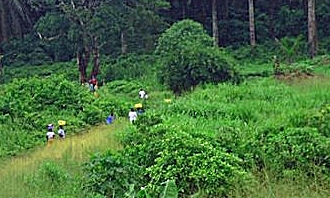This project has been completed under the direction of Peace Corps Volunteer Sarah Rhodes. The project was designed to build a water system for the community, consisting of a 3-kilometer water line from the water source and two water stations.
To read about the beginning of the project, CLICK HERE.

A summary of Sarah’s report is as follows:
Gbaka is a small agrarian community of approximately 320 people that rests North of Ketou and South of Adakplame. Most members of the community are subsistence farmers and very few of the community’s children attend school. Malnutrition and waterborne illnesses were reported to be significant problems by neighboring health center staff. The community has historically had very limited access to water.
Under this project the community worked to construct a ~3 km long water pipeline, branching off from the local waterworks, and two pipe stands. They contributed over 25% of the total cost by providing the majority of the labor themselves- digging the pipeline trench, helping the mason to build the water stations, and preparing food for all those involved in construction.
I worked with a peer-educator from the local high school to deliver hygiene and water-storage trainings in local language. As a result of these trainings, community members have improved their sanitation practices, helping the community to minimize the financial burden of waterborne illnesses.
A second training session served the community’s newly formed water management committee- teaching 6 community leaders how to track the community’s water usage, keep accounts of water fees, pay monthly bills, and budget for infrastructure repairs. The formation and training of this committee gave community members control over, and a sense of investment in, their new water infrastructure and allows them to maintain the longevity of this investment in the community.
An unexpected benefit of the project was the development of community agency for the people of Gbaka. Prior to this project, community members lacked a voice within the local government structure. The communication this project cultivated between the community of Gbaka and the Department of Water and Sanitation at the Ketou Mayor’s Office has brought other community issues to the attention of the local government. The relationship that community members (especially the Water Management Committee’s president) have built with the Mayor’s Office gives the community more power to address their concerns and take part in the development and improvement of their community.
All trainings have been completed and post-test results showed significant increases in community members’ awareness of the causes of waterborne illness, an increased knowledge of essential hygiene actions (times when hand-washing is crucial) and appropriate water storage techniques.
There was also a high rate of self-reported improved personal hygiene. A six-member Water Management Committee has been elected and trained on account keeping, money management, and infrastructure maintenance. The president is currently acting as the community liaison with the mayor’s office and plumber to ensure timely repairs to the generator and the completion of the construction work in Gbaka.
A source of potable water available within Gbaka will saves community members a significant amount of time, as they no longer have to travel long distances to find and haul water from outside sources. This time will be better used to improve food security, youth education, and general living conditions within the community. Improved sanitation practices and proper water storage methods, accompanied by access to potable water, help community members minimize the financial burden of waterborne illnesses. The formation of a water management committee gives community members control over, and a sense of investment in, their new water infrastructure and allows them to maintain the longevity of this investment in the community.